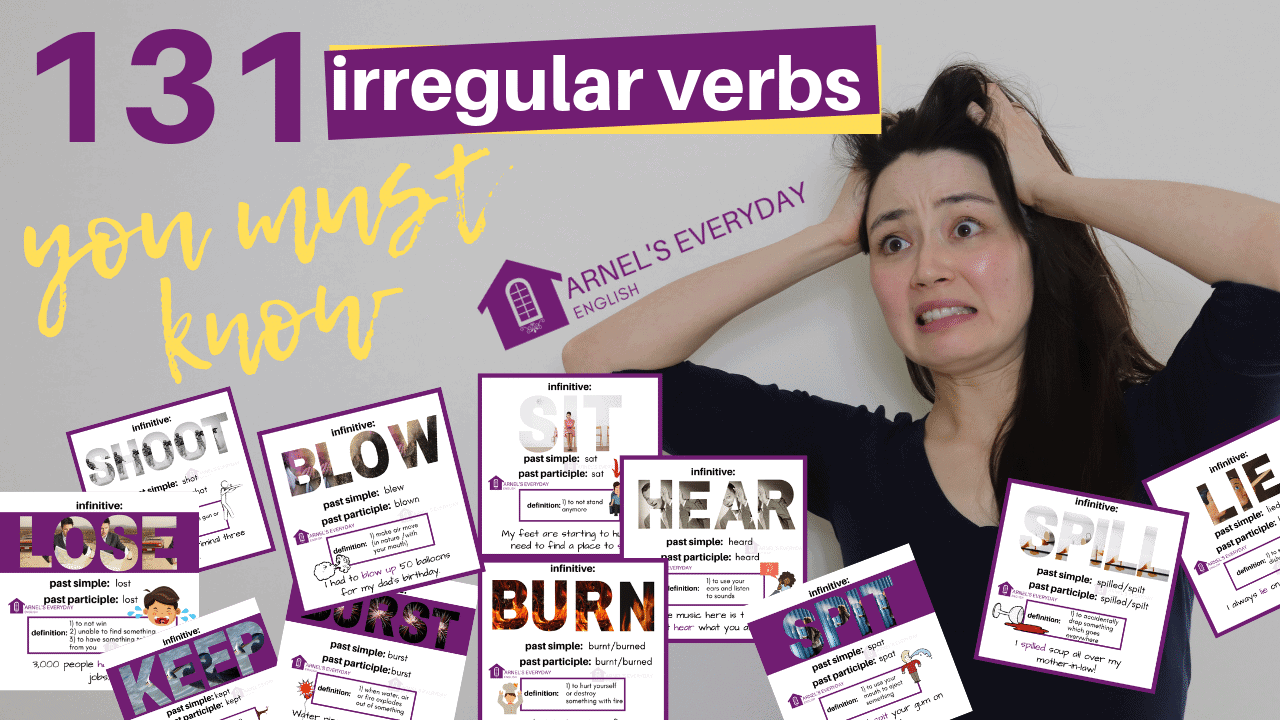What are ‘irregular verbs’?
Irregular verbs are the opposite of ‘regular verbs‘.
Regular verb examples:
infinitive: play
past simple: played
past participle: played
infinitive: carry
past simple: carried
past participle: carried
infinitive: book
past simple: booked
past participle: booked
As you can see, ‘regular verbs‘ have an -ed or -ied ending in the past simple and past participle.
This makes them easy!
But, in English we love exceptions. ‘Irregular verbs’ do not have an -ed or -ied ending. For example:
infinitive: eat
past simple: ate
past participle: eaten
infinitive: put
past simple: put
past participle: put
So, irregular verbs are…irregular. There is no pattern.
You need to memorize them.
(#59, #65 and #66 can easily be confused)
In today’s lesson I am going to give you 131 irregular verbs you must know. A plain list of vocabulary to memorize can be a bit boring. So, just for you, here are 131 irregular verbs with images and definitions.
Let’s make grammar visual!
You can download this full list in my free library. You’ll need my password. Subscribe to me and I’ll give you my super secret special amazing password 😉 You’ll also get all of my lessons directly in your inbox so you never miss a lesson!
SUBSCRIBE NOW, and get the password!
Before we begin, here’s an extra tip:
Many regular American verb forms are irregular in British English. For example:
American English
infinitive: dream
past simple: dreamed
past participle: dreamed
British English
infinitive: dream
past simple: dreamt
past simple: dreamt
So, as you look through this lesson, remember this!
Wow you made it! Great job! You are a soon-to-be irregular pro! 🙂
Thank you for reading and I’ll see you very soon for another lesson.
Your teacher,
Arnel 🙂








































































































































Thanks for this great summary!
But why #61, #81, #87 considered as irregulars?
Peter
Hi Peter!
I’m so glad you liked this summary!
61: Whoops! I forgot to include the British English ‘leant’ – this makes it irregular (I have now updated that image. Thank you for pointing this out!)
81: SAW can be regular (saw-sawed-sawed) or irregular if you use the past participle ‘sawn’.
87: SEW can be regular (sew-sewed-sewed) or irregular if you use the past participle ‘sewn’.
😉
Arnel
THANKS A LOT # 124. THROW SOME CORRECTION IS THEIR MADAM.
Thank you so much Sanjay. I have corrected #124!
Thanks Arnel!
So there are verbs verbs can be regular or irregular 🙂 Hope this is the future English! 🙂
Peter
You’re very welcome Peter!